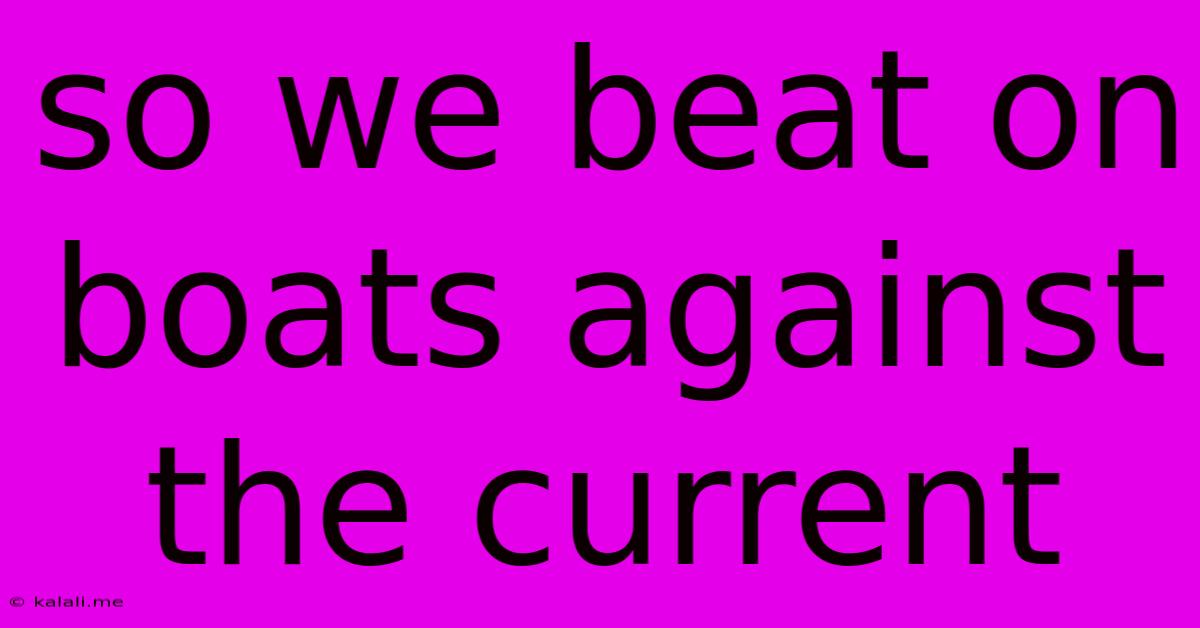So We Beat On Boats Against The Current
Kalali
May 24, 2025 · 3 min read

Table of Contents
So We Beat On, Boats Against the Current: Exploring F. Scott Fitzgerald's Enduring Message
F. Scott Fitzgerald's iconic closing line from The Great Gatsby, "So we beat on, boats against the current, borne back ceaselessly into the past," is more than just a poignant ending; it's a profound statement about the human condition. This seemingly simple sentence encapsulates themes of relentless pursuit, the inescapable pull of the past, and the ultimately futile nature of fighting against fate. This article delves deeper into the meaning and enduring relevance of this famous quote.
The Metaphor of the Boat:
The image of a boat battling a strong current immediately establishes a sense of struggle and resistance. The boat represents the individual, constantly striving against the powerful forces of life. This struggle is not merely physical; it encompasses the emotional and psychological battles we face daily. We are perpetually trying to move forward, to achieve our goals, to overcome obstacles, much like a boat fighting against a relentless current.
The Inescapable Current:
The current, however, is relentless. It symbolizes the past, our memories, our ingrained habits, and the societal forces that shape us. Fitzgerald masterfully uses the imagery of being "borne back ceaselessly into the past" to highlight the inescapable nature of our history. No matter how hard we try to row forward, the current pulls us back, reminding us of past mistakes, lost opportunities, and unfulfilled desires. This is a powerful reminder that our past experiences profoundly influence our present and future.
The Relentless Pursuit:
Despite the seemingly insurmountable odds, the boats continue to beat on. This signifies the inherent human drive to persevere, to strive for something more, even when facing insurmountable challenges. This unwavering spirit, this relentless pursuit, is what keeps us going, even when we feel like we're constantly being pushed back. It's the human spirit's refusal to surrender, a constant striving for progress and self-improvement, despite knowing the odds may be stacked against us.
Themes Explored in the Quote:
This quote touches upon several key themes prevalent in Fitzgerald's work and in the broader context of the human experience:
- The American Dream: The relentless pursuit of the boat against the current can be seen as a reflection of the American Dream, the relentless pursuit of success and happiness, often facing setbacks and disappointments.
- The Illusion of Progress: Despite the constant effort, the boat is perpetually pulled back, suggesting the illusory nature of absolute progress. We may achieve certain goals, but the past continues to shape our experiences and perspectives.
- The Power of Nostalgia: The current pulling us back represents the power of nostalgia and the enduring influence of our memories. While we strive for the future, we are simultaneously tethered to the past.
- The Acceptance of Fate: Ultimately, the quote suggests an element of acceptance. While we strive, we must also acknowledge the limitations imposed by our past and the forces beyond our control.
The Enduring Relevance:
Fitzgerald's powerful closing line continues to resonate with readers today because it speaks to the universal human experience of striving, struggling, and ultimately accepting the complexities of life. It's a reminder that the journey itself, the constant struggle, is as significant as the destination, and that our past, while influential, does not define our future. The relentless beating of the boats against the current is a testament to the enduring human spirit and its unwavering will to keep moving forward, even when pulled back by the relentless currents of life. It's a message of perseverance, acceptance, and the profound understanding of our own mortality within the grand scheme of existence.
Latest Posts
Related Post
Thank you for visiting our website which covers about So We Beat On Boats Against The Current . We hope the information provided has been useful to you. Feel free to contact us if you have any questions or need further assistance. See you next time and don't miss to bookmark.